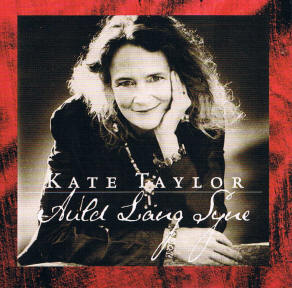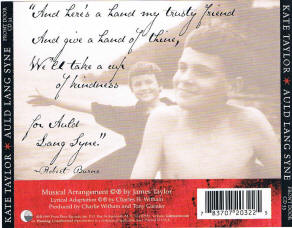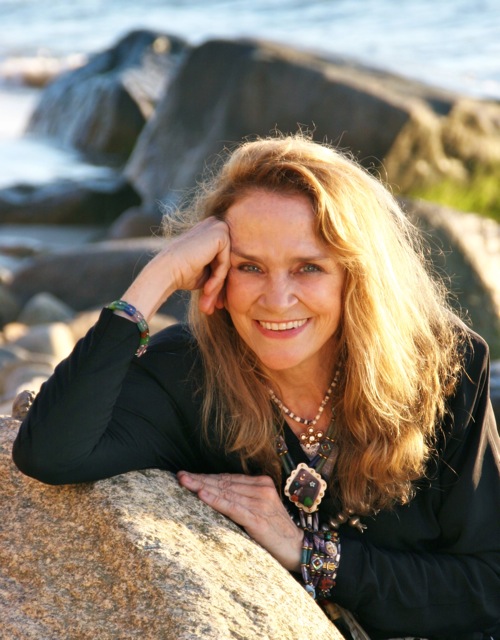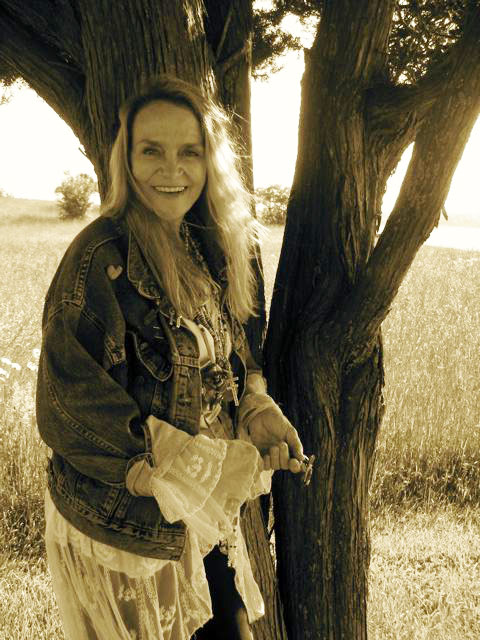|
Edited
by Frank R. Shaw, FSA Scot, Dawsonville, GA, USA
Email:
jurascot@earthlink.net


Front and Back Covers of her CD
If
this was a newspaper article, I would begin with Dateline: Knightsbridge,
London. I am sitting in a wee flat Susan and I rented while on our way
to speak at the University of Glasgow’s annual Robert Burns conference
hosted by The Centre for Robert Burns Studies. There is something thrilling
about renting a flat in this great city, shopping for groceries at Harrods,
and cooking your own dinner. Completing this article on a unique lady while
here - Kate Taylor - is simply icing on the cake. She is a talented folk
singer, songwriter, and gifted artist and has done for Auld Lang Syne
what Robert Burns did with this special song many years ago – improved the
lyrics. Auld Lang Syne has become a New Year’s song which occupies a
special spot in the lives of Scots in particular. The world at large also
celebrates this song at the close of one year and the beginning of another.
Thus, many people do not know or care that the song as we know it was
written by Robert Burns and that Scots in general claim the song as theirs.
Yet, the world has taken possession of it. Guy Lombardo is responsible for
most Americans knowing about Auld Lang Syne. He heard a group of
Scots just off the boat from the auld country singing it in his homeland of
Canada, and for thirty years he ended his New Year’s programs, first on
radio and then television, with Auld Lang Syne. Most feel New Year’s
Eve would not be the same if it was not played or sung as the old year
ticked down to welcome in the new. Even though most revelers do not know the
lyrics, it has become a focal point of New Year’s Eve all around the world.
I
ran across Taylor’s interpretation of Auld Lang Syne recently while
going through our Christmas CDs to celebrate the recent season. According to
the printed label, back in 2003 an acquaintance went to the trouble to gift
us a homemade holiday CD and the last song recorded was Kate Taylor’s
version of Auld Lang Syne. Several days later while traveling I
played the CD and would immediately punch the replay button to hear Kate
again sing the song. The music in the old truck never sounded better! As I
drove along the highway I listened to other Christmas music but kept going
back to Taylor’s great adaptation of Robert Burns’ song. After finishing my
appointment and heading for home, I found myself doing the same thing –
going back to Taylor’s interpretation of the song. I knew I was on to
someone and something very special – Kate Taylor and her rendition of
Auld Lang Syne.

Picture of Kate taken by Peter Simon
For the first time in our 104 articles on the Robert Burns Lives!
website you will be able to hear an audio of an artist’s performance. As you
listen to her sing the song below, here are some of the new lyrics that were
important to me.
We
two have run about the hills
And gathered flowers fine
We’ve wandered many a weary foot
Since auld lang syne.
We
two have sported in the brook
From morning sun ‘til dine
But seas between us have roared and swelled
Since auld lang syne.
Click here to listen to her version of
Auld Lang Syne
These words recall days of our youth and dear friends and loved ones across
the ocean. This week while in London, Susan and I celebrated a wee bit of
auld lang syne at Porter’s English Restaurant with Clark and Ann McGinn and
Jim and Wendy Henderson. Clark, by the way, is the top global ambassador for
Robert Burns, having traveled to Burns speaking engagements the equivalent
to 4-1/2 times around the world. He informed me that by the end of this
Burns season, he would be close to increasing that number to five. WOW! As
you can surmise, these are not local speaking engagements like mine or
yours! Jim, a good Burns Dinner speaker in his own right, also serves as
Honorary Secretary of the London Burns Club. Sure, we may have told some of
the same stories we did years ago, and we laughed, teased and had fun just
the same. We were so merry that the owner came over and wanted to know what
we were celebrating, and he ended up telling us a few funny stories as well.
That, to me, is what auld lang syne is all about.
Auld Lang Syne by Taylor was released as a single and later became a
part of her first CD in over 20 years, “Beautiful Road”. Yes, you heard that
right. Her family came first and her career was put on hold while the
children grew up. In other writings, Kate has emphasized the word
reconciliation as well, a new twist for me to an old song. She can write
lines like those above since her own ancestors sailed from Scotland in the
1790s bound for North Carolina, just like mine. Someone remarked that
Auld Lang Syne would never die. Neither will Kate’s version of it! I’m
grateful for her decision to release a modern version. Nothing wrong with
the way Burns rewrote it, but Kate’s version, a lyrical adaptation she did
with her husband, Charles Witham, speaks more to our day in words we
understand. To our readers I must say it is a unique privilege to have the
opportunity to chat briefly with a very busy lady. Here are a few questions
I asked Kate regarding her life and her version of Auld Lang Syne.
FRS: How did you become a musician and what influences pushed you in that
direction? When did you record your first record? Since you come from a very
talented and musically gifted family, what part, if any, did they play in
your decision to become a musician?
KT: When we were coming up in Chapel Hill, NC, music was an extremely
important part of our family context as well as that of our community and
our world. My brothers and I were learning instruments, listening to many
different types of music via radio, concerts, recordings, and tv, and
informally singing songs together as a family and individually. During our
teenage years, music was the way our generation spoke to itself. Those were
heady days, with protest and social change, and the music was right in the
thick of it. Being in Chapel Hill, we were in the center of a world of
different musical styles, folk songs originating from the British Isles and
morphing here in the States into bluegrass and Appalachian folk songs, along
side country, rockabilly, rhythm and blues, gospel, rock and roll and the
blues, jazz, be-bop…pop, the list goes on and on. We were drawn to it all
and have utilized all these styles to varying degrees in the music we make.
I had my first band at the age of 15, we did mostly R&B covers. It was fun
and still is!
FRS: Many artists have recorded Auld Lang Syne but yours is different
because of the lyrics. Tell us how you and your husband Charles came to
rewrite some of the lyrics.
KT: Back in ’98, we were putting a show together for New Year’s Eve, here on
Martha’s Vineyard where we live and have raised our family. My husband,
Charlie Witham, was a writer and a poet. We thought it would be appropriate
to work up a version of Auld Lang Syne for the evening’s show. We
looked up the lyrics and they were, though lovely, in what I guess you might
call old Scottish? Forgive me, I don’t know. We realized that we would need
to do some translating in order to make them understandable to our audience.
Charlie was determined to stick as closely as he could to Robert Burns’
ideas, his intention being to bring Burns’ lovely images to light. I love
how he worked them. There were a lot of visits to the dictionary. Although
my dear and gifted husband Charlie is no longer with us, this rendition he
brought to the fine sentiments of Robert Burns is part of the wonderful
legacy he left behind for us.
FRS: Many critics of Robert Burns say he does not speak to today’s modern
world. Yet, your lyrics to Auld Lang Syne certainly do. What made you
decide to release the song with contemporary lyrics?

KT: I beg to differ with Burns’ critics regarding the lack of validity of
Burns’ lyrics and poems in today’s world! That is like saying Shakespeare
doesn’t speak to and of human kind today. What could be more current than
love and loss and reconnection? We all have been familiar with at least a
verse or the chorus of the song from the years of singing it at the new
year. We thought that more of Burns’ lyrics deserved to be heard. We asked
James [her brother and singer/songwriter James Taylor] if he would be
interested in working on the musical arrangement for the song, and voila!,
his magic touch! We recorded it in a studio near Woodstock, NY, with James
on guitar and harmony vocals, Tony Garnier on bass, and Mindy Jostyn on
violin. It had a special feel to it that made us want to release it right
away for the turning of the millennium, and we did. Later we finished
“Beautiful Road”, the album that Auld Lang Syne was to be included
in. That album was released in 2002.
FRS: I understand you released your Auld Lang Syne as a single,
donating all proceeds to charity. Tell us, please, how this came about and
which charity you donated to?
KT: The initial release of the single was done in conjunction with and for
the benefit of the Elizabeth Glazer Pediatric Aids Foundation. Included with
the offering of the CD single, we had an auction for CDs that James and I
signed.
FRS: The membership of our Burns Club of Atlanta has met monthly since 1896.
In 1910 a cottage was built to the same specifications as the one in which
Burns was born in Alloway, Scotland. At the end of each meeting we “circle
around” and sing Auld Lang Syne. I realize this is not a question but
may be of interest to you.
KT: That is wonderful. I would love to come to one of your gatherings and I
would very much love to see the cottage. Do you make it available for
nightly rentals? I’m only partly kidding. My daughters and I went to
Scotland in 2001, around New Year’s Eve. We were very close to Burns country
on the west coast. We sang Auld Lang Syne with some great folks we
met in a pub who were very much involved with the Robert Burns Society
there. It felt like we were coming home.
FRS: It is said that Auld Lang Syne had a big influence on your life
and played an important part in your returning to the recording studio to
continue your work after nearly two decades away from music. Please tell us
how and why it did.
KT: While recording the vocals for our version of the song, I felt as if
there were other, deeper and wiser forces at work also, like there were
other souls, from auld lang syne, joining in. I am grateful for the response
that our version has elicited. I know Charlie would be very moved at the
affection people have shown for his work with it, and it is humbling that we
can be a small part of the great story that is Robert Burns and Auld Lang
Syne.
FRS: Thank you, Kate, for your time and the courtesies extended to me. Is
there a parting word you would like to leave with our readers about what
Auld Lang Syne means to you?
KT: There’s this feeling that I have that from deep in my being I was drawn
to sing the song, the call being hard wired into my DNA from Scottish
ancestors and the salty winds of Scotland. Perhaps we all are drawn to sing
it and therefore we do, and at what better and more meaningful a time than
at the dawn of the new year?
(FRS: 1.13.11) |

